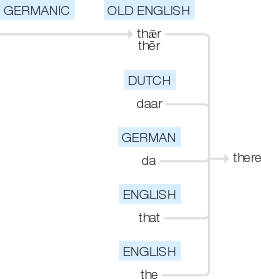There
Old English thǣr, thēr of Germanic origin; related to Dutch daar and German da, also to that and the.
wiktionary
From Middle English there, ther, thare, thar, thore, from Old English þēr, þǣr, þār(“there; at that place”), from Proto-West Germanic *þār, from Proto-Germanic *þar(“at that place; there”), from Proto-Indo-European *tar-(“there”), from demonstrative pronominal base *to-(“the, that”) + adverbial suffix *-r.
Cognate with Scots thar, thair(“there”), North Frisian dear, deer, där(“there”), Saterland Frisian deer(“there”), West Frisian dêr(“there”), Dutch daar(“there”), Low German dar(“there”), German da, dar-(“there”), Danish der(“there”), Norwegian der(“there”), Swedish där(“there”), Icelandic þar(“in that place, there”).
etymonline
there (adv., conj.)
Old English þær "in or at that place, so far as, provided that, in that respect," from Proto-Germanic *thær (source also of Old Saxon thar, Old Frisian ther, Middle Low German dar, Middle Dutch daer, Dutch daar, Old High German dar, German da, Gothic þar, Old Norse þar), from PIE *tar- "there" (source also of Sanskrit tar-hi "then"), from root *to- (see the) + adverbial suffix -r.
Interjectional use is recorded from 1530s, used variously to emphasize certainty, encouragement, or consolation. To have been there "had previous experience of some activity" is recorded from 1877.
